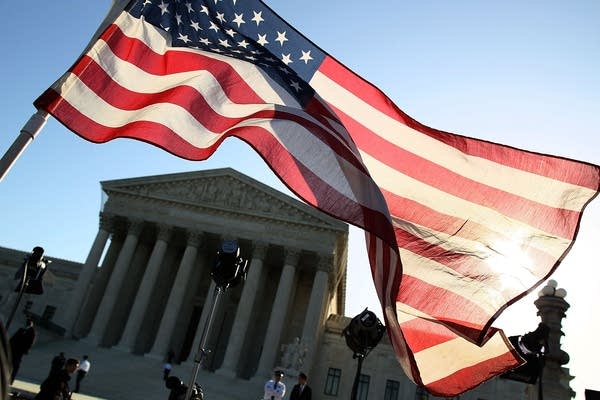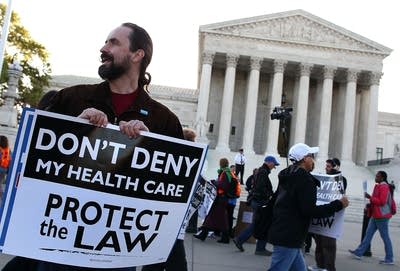State: Health care law repeal would hit harder outside MN
Go Deeper.
Create an account or log in to save stories.
Like this?
Thanks for liking this story! We have added it to a list of your favorite stories.

In a landmark case that has big implications for the nation's health care system, the U.S. Supreme Court Monday begins hearings on a challenge to the federal health care overhaul.
The court will hear arguments on several questions, including whether the federal government can expand the Medicaid program or require every American to obtain health insurance. Under the Affordable Care Act passed by Congress in 2010, individuals must buy health insurance starting in 2014 or pay a penalty — a mandate that broadens the pool of insured persons to include the young and healthy.
Other states are likely to be affected more if the court dismantles the law, but Minnesotans still have reason to pay attention.
EXPANDING COVERAGE
Turn Up Your Support
MPR News helps you turn down the noise and build shared understanding. Turn up your support for this public resource and keep trusted journalism accessible to all.
One of the main goals of the federal health care law is to expand health care coverage to 30 million Americans who don't have insurance.
That's a big deal for community clinics like the Community University Health Care Center in Minneapolis, where one out of every four patients has no insurance. That's at least 3,000 people each year at the Phillips neighborhood clinic alone.
Statewide, nearly half a million people do not have insurance.

For Deanna Mills, executive director of the Community University Health Care Center, the Affordable Care Act is almost a dream come true. Mills, who has spent her career trying to obtain health care for those unable to pay for it, said it would be a huge loss for health care if the court invalidates all or part of the law.
"I would cry," Mills said. "I would cry right now even thinking about it."
About 9 percent of Minnesota residents are uninsured, the Kaiser Family Foundation reports. Other states have much higher rates. In Texas, for example, 25 percent of residents are uninsured.
But in Minnesota the percentage of uninsured residents has been growing. Mills said people without health insurance tend to have more health problems.
"Maybe 91 percent are insured. But those 9 percent are really sick, are very diverse and probably need health care coverage as much as anybody else," Mills said.

Still, the state could manage better than most other states if the high court strikes down major parts of the health law, said Lucinda Jesson, commissioner of Minnesota's Department of Human Services. That's because Minnesota has been improving its health care system for many years, she said.
"I think what the Affordable Care Act does is give Minnesota a lot of tools to get where we were going anyway, faster and with more federal dollars," Jesson said.
Some of those federal dollars come through the health law's expansion of Medicaid, the joint federal and state insurance program for low-income people. That's one of the issues the high court will consider that hasn't received much attention.
If the court were to strike down that part of the law, Jesson projects Minnesota would lose about $2 billion in federal money between Jan 2014 and July 2015.
AN AFFRONT TO RELIGION?
Although the question before the court largely concerns whether the government can require individuals to buy health insurance, some critics of the law say what's at stake in the Supreme Court case is the right to freedom of religion.
The Obama administration wanted to require hospitals and other religious-affiliated organizations run by religious organizations to provide free birth control coverage to employees. The administration has since backed off that requirement, and now has asked that workers be able to obtain free contraception directly from health care companies.
But church leaders don't think that goes far enough. They want any business owner who objects on conscience grounds to be able to opt out of offering coverage for contraceptives.
Religious groups that oppose the rule include St. Paul-based Pro-Life Action Ministries. If the law stands with that provision it would be an assault on religious freedoms, said the group's executive director, Brian Gibson.
"We have a long-standing tradition in this country because of that First Amendment, of protecting the conscience rights of citizens as well as the organizations that citizens belong to," Gibson said. "Our conscience rights are being trampled on by this."
INDIVIDUAL MANDATE
The question of whether the federal government may require every American to obtain health insurance or face a penalty also has been contentious.
Recent polls show a razor-slim majority of Americans oppose the individual mandate and believe the court will strike it down.
Minnesota's health plans and health insurance giant UnitedHealth Group have a lot at stake in that issue. The mandate will require more people to pay into the system, particularly younger and healthier people, which will help offset the cost of covering more people.
If the high court strikes down the mandate but leaves the rest of the law, that would be a real problem, said Geoff Bartsh, vice president of public policy and government relations at Medica, a nonprofit health plan.
"By doing that, you're allowing people only to enter and pay into the system when they're taking out; you're never getting people into the health care system who are paying in to help care for others," Bartsh said. "And the system just can't afford that; the system will eventually collapse."
Whatever the Supreme Court decides may not be the final word on the health care law. A change in the White House or Congress after the November election could mean changes in the law as well.






